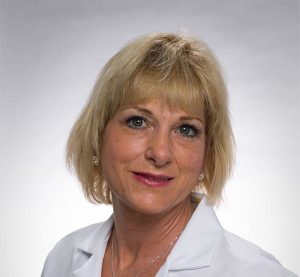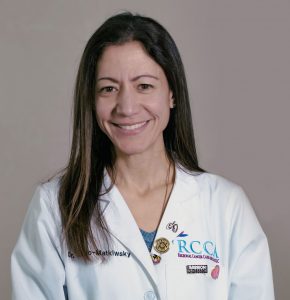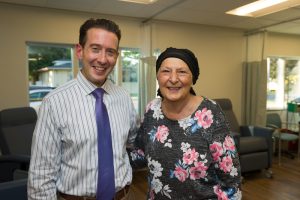
Early Signs of Inflammatory Breast Cancer
Regional Cancer Care Associates (RCCA) provides comprehensive treatment of cancer and blood disorders to patients throughout New Jersey, Connecticut, Maryland, and the Washington, DC, area.
HIPAA Alert: Potential Data Breach Learn More
Questions on Oncology, Hematology and/or Infusion Clinical Services due to COVID-19 Crisis – CALL 833-698-1623
Important Information for Our Patients Regarding the Coronavirus.
RCCA Providing Area Cancer Patients with Access to Care During Coronavirus Outbreak
RCCA Offering Patients Virtual Visits During Coronavirus Pandemic
An estimated 8,580 women across New Jersey will be diagnosed with breast cancer this year.1 That number reflects a significant increase from years past. For example, the average annual number of diagnoses from 2015 to 2019 was 7,906.2
While the increased number of cases is distressing, medical oncologists with Regional Cancer Care Associates (RCCA) say it’s important to keep three facts in mind:
1. The situation in New Jersey is part of a larger trend. “Unfortunately, breast cancer diagnoses across the United States have been rising by about one-half of 1% a year for the past several years, and also are rising in many countries around the world,”3,4 said Aileen L. Chen, MD, a board-certified medical oncologist and hematologist who practices at the Freehold and Holmdel offices of RCCA, one of the nation’s largest networks of oncology specialists.

“Of course, when a woman learns she has breast cancer, her focus is not on epidemiology or geographic trends, but I think this context is important for two reasons. First, New Jersey has a history of actual and possible ‘cancer clusters,’ so when people here learn they have cancer, their thoughts can run to some environmental factor or other problem specific to the state that may be the cause. In this instance, however, the increased diagnoses in New Jersey are in step with what’s occurring nationwide. Second, a cancer diagnosis can be very isolating. As much as the people in your life love you and want to support you, they can’t fully understand what you’re facing, including the natural tendency to ask, ‘Why me?’ If you recently have been diagnosed with breast cancer, I think it’s important to know that many, many women across America are exactly where you are right now in terms of having to face this diagnosis. And it’s even more important to know that more than 4 million women in the U.S. have gone forward from the difficult place where you are now to live their lives as breast cancer survivors.”5
So why are breast cancer rates increasing nationally — and even globally?
Dr. Chen explained that researchers have identified a number of causes, including a sedentary lifestyle, alcohol consumption, diet, being overweight or obese after menopause, and environmental conditions, as well as changes in childbearing patterns and average age at onset of puberty and start of menopause that can affect a woman’s long-term exposure to the sex hormone estrogen.4,6,7 “Breast cancer, like most cancers, is multi-factorial in nature, meaning that many factors come together and interact in complex ways to drive development of the disease. The good news, however, is that several of those factors are within a woman’s power to modify and so reduce her risk,” Dr. Chen noted.
2. Physicians have a broad — and expanding — range of options for treating breast cancer. “We have never had a greater ability to individualize care to treat a woman’s breast cancer in a way that offers the best possible outcomes while taking into consideration her overall health, her preferences for treatment and her quality of life,” said Julianne W. Childs, DO, a board-certified medical oncologist and hematologist who practices at the Cape May Court House and Marmora offices of RCCA.
“The last several years have seen a dramatic expansion of treatment options. This includes more surgical techniques, including several breast-sparing approaches. In terms of medical management, it means immunotherapies, targeted therapies, chemotherapy with fewer side effects than older regimens, and hormonal treatment strategies to reduce the risk of recurrence. Radiation therapy approaches also have evolved, and we’ve learned much more about how to combine and sequence different surgical, medical and radiotherapy interventions in a way that is really tailored to each woman’s specific situation,” Dr. Childs said.
The medical oncologist added, “As a result of the advances, the five-year relative survival rate for women diagnosed with localized disease — which represents the majority of newly identified cases — is now 99%.8 We also have made significant progress in treating women with more advanced disease, including extending life while maintaining a good quality of life for women with metastatic breast cancer.”
Dr. Childs noted, “Thanks to these treatment advances, even though the rate of breast cancer diagnoses is rising in New Jersey, the breast cancer death rate is falling, with declines in 20 of New Jersey’s 21 counties. The sole exception is Salem County, where the rate is stable. The toll that breast cancer takes remains far too high, as evidenced by the fact that an estimated 1,200 women in New Jersey will lose their lives to the disease this year, but we have been driving that number down, and we are determined to continue doing so by making the most effective use possible of the therapies available to us.”

BREAST CANCER DIAGNOSES AND DEATHS: RECENT TRENDS IN NEW JERSEY
| Diagnoses | Deaths | ||
Location | Average | 5-year Trend | Average | 5-Year Trend |
United States | 253,845 | Rising | 42,101 | Falling |
New Jersey | 7,906 | Rising | 1,264 | Falling |
Atlantic County | 241 | Stable | 41 | Falling |
Bergen County | 904 | Rising | 127 | Falling |
Burlington County | 447 | Rising | 76 | Falling |
Camden County | 454 | Stable | 80 | Falling |
Cape May County | 110 | Stable | 21 | Falling |
Cumberland County | 112 | Stable | 22 | Falling |
Essex County | 656 | Rising | 110 | Falling |
Gloucester County | 287 | Stable | 45 | Falling |
Hudson County | 407 | Stable | 62 | Falling |
Hunterdon County | 134 | Stable | 18 | Falling |
Mercer County | 309 | Stable | 51 | Falling |
Middlesex County | 646 | Stable | 104 | Falling |
Monmouth County | 643 | Stable | 96 | Falling |
Morris County | 496 | Stable | 69 | Falling |
Ocean County | 608 | Stable | 109 | Falling |
Passaic County | 399 | Rising | 61 | Falling |
Salem County | 58 | Stable | 11 | Stable |
Somerset County | 310 | Stable | 40 | Falling |
Sussex County | 137 | Stable | 24 | Falling |
Union County | 449 | Stable | 79 | Falling |
Warren County | 98 | Stable | 19 | Falling |
Source: National Cancer Institute. State Cancer Profiles. Available at: https://statecancerprofiles.cancer.gov/. Accessed May 3, 2023.

“The bottom line is that there are many steps available to you right here, right now to reduce your risk for breast cancer. And if, unfortunately, you should receive a diagnosis of breast cancer, know that there also is excellent care and abundant cause for hope available to you right here, right now. At RCCA, we pride ourselves in providing patients with access to the latest therapies and clinical trials in the community setting — in conveniently located offices where everyone from the physician to the receptionist knows you by name, and where our care plans are carefully tailored to your specific situation and needs. We hope that you will never require that care, but if you do, we’re here for you,” Dr. Abdo-Matkiwsky said.
*******
Drs. Chen, Childs, and Abdo-Matkiwsky are among the 90+ cancer specialists who treat patients at more than 20 RCCA care centers located throughout New Jersey, Connecticut, Maryland, and the Washington, DC, area. RCCA oncologists and hematologists see more than 23,000 new patients each year and provide care to more than 225,000 established patients, collaborating closely with their patients’ other physicians. They offer patients the latest in cutting-edge treatments, including immunotherapies and targeted therapy, as well as access to a wide range of clinical trials. In addition to serving patients who have solid tumors, blood-based cancers, and benign blood disorders such as anemia, RCCA care centers also provide infusion services to people with a number of non-oncologic conditions—including multiple sclerosis, Crohn’s disease, asthma, iron-deficiency anemia, and rheumatoid arthritis—who take intravenously-administered medications.
To learn more about RCCA, call 1-844-346-7222 or visit RCCA.com.
References:
BioMed Res Int. 2022. doi.org/10.1155/2022/9605439.
For more information or to schedule an appointment,
call 844-346-7222. You can also schedule an appointment by calling the RCCA location nearest you.

Regional Cancer Care Associates (RCCA) provides comprehensive treatment of cancer and blood disorders to patients throughout New Jersey, Connecticut, Maryland, and the Washington, DC, area.

When people think of breast cancer, they generally think of it affecting women. However, in rare circumstances, breast cancer can affect men, most commonly in

First diagnosed with breast cancer in 1992, she has persevered in her battle against the disease for more than 30 years.

Regional Cancer Care Associates is one of fewer than 200 medical practices in the country selected to participate in the Oncology Care Model (OCM); a recent Medicare initiative aimed at improving care coordination and access to and quality of care for Medicare beneficiaries undergoing chemotherapy treatment.